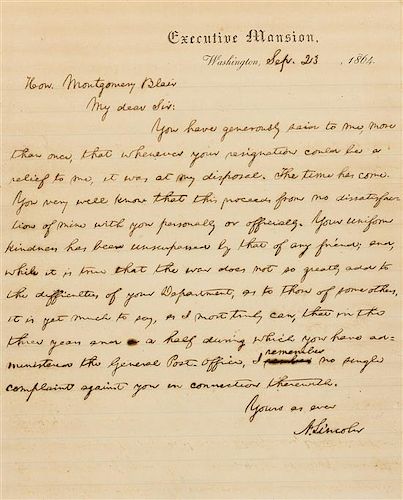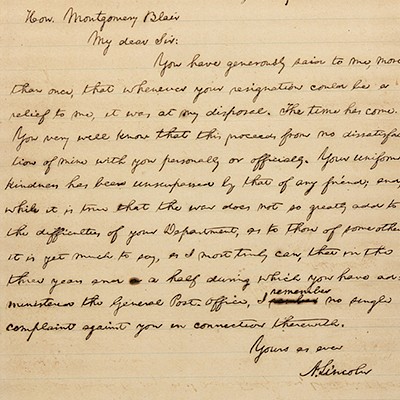LINCOLN, Abraham (1809-1865). Autograph letter signed ("A. Lincoln"), as President, to Montgomery Blair. Washington, D. C., Sept
Lot 326
About Seller
Hindman
1338 West Lake Street
Chicago, IL 60607
United States
Recognized as the Midwest's leading fine art auctioneers, Hindman Auctioneers has built a worldwide reputation based on a full service approach to the auction business tailored to meet the individual needs of our clients. Coming from a variety of educational backgrounds, specialists bring years of e...Read more
Categories
Estimate:
$30,000 - $50,000
Absentee vs Live bid
Two ways to bid:
- Leave a max absentee bid and the platform will bid on your behalf up to your maximum bid during the live auction.
- Bid live during the auction and your bids will be submitted real-time to the auctioneer.
Bid Increments
| Price | Bid Increment |
|---|---|
| $0 | $25 |
| $500 | $50 |
| $1,000 | $100 |
| $2,000 | $250 |
| $5,000 | $500 |
| $10,000 | $1,000 |
| $20,000 | $2,500 |
| $50,000 | $5,000 |
| $100,000 | $10,000 |
About Auction
By Hindman
Nov 13, 2018
Set Reminder
2018-11-13 11:00:00
2018-11-13 11:00:00
America/New_York
Bidsquare
Bidsquare : Fine Books and Manuscripts
https://www.bidsquare.com/auctions/hindman-auctions/fine-books-and-manuscripts-3545
Hindman Bidsquare@hindmanauctions.com
Hindman Bidsquare@hindmanauctions.com
- Lot Description
LINCOLN, Abraham (1809-1865). Autograph letter signed ("A. Lincoln"), as President, to Montgomery Blair. Washington, D. C., September 23 1864.
1 page, 4to, bifolium, with integral leaf blank, Executive Mansion stationery; silked on both sides, short tears to center fold (not affecting any letters), minor toning, some minor ink burn. Provenance: Montgomery Blair (1813-1883), Maryland politician and lawyer, Postmaster General to President Lincoln; by descent to Montgomery Blair Jr.
LINCOLN REQUESTS MONTGOMERY BLAIR'S RESIGNATION
Lincoln writes to Blair, Postmaster General and member of his Cabinet: "You have generously said to me, more than once, that whenever your resignation could be a relief to me, it was at my disposal. The time has come." With one ink emendation in Lincoln's hand.
After Lincoln's 1860 election, Blair was appointed Postmaster General; he was the sole cabinet member who stood with Lincoln in support of resupplying Fort Sumter at the outset of the Civil War in 1861. Blair was a devout abolitionist, and prior to Lincoln's election, he served as counsel to Dred Scott in the 1856 Supreme Court case Dred Scott vs. Sanford. By 1863, when the Union began to plan for the end of the war (which would not come for another two years), Reconstruction was a topic of much debate in the Republican Party; Blair's views of reconstruction were at odds with the radical wing of the party.
The Republican Party was deeply divided by the 1864 election and the radical Republicans issued an ultimatum - they would not support Lincoln in his bid for reelection unless Blair was removed from his cabinet. Lincoln faced a challenge from third-party candidate John C. Frémont, the nominee of the Radical Democracy Party, which criticized Lincoln for being too moderate on the issue of racial inequality. In September 1864, Lincoln learned that Frémont would withdraw from the race if Montgomery Blair would resign from his cabinet. Frémont renounced his candidacy on September 22, 1864; the next day, Lincoln accepted Blair's resignation. Blair, in a letter to his wife, Elizabeth Woodley Blair, speculated, "I suppose, however, that he thinks it will help to appease the Frémonters' and Radicals, if I am dropped." In their biography of Lincoln, Nicolay and Hay note: "the opposition to Blair was not confined to the radical demonstrations in the Baltimore Convention and out of it… Some of the most judicious Republicans in the country, who were not personally unfriendly to Blair, urged upon the President the necessity of freeing himself from such a source of weakness and discord" (Abraham Lincoln: A History, Vol. IX, p.337). Lincoln's retained secretarial copy of this letter signed by the President is in the Robert Todd Lincoln papers at the Library of Congress.
Estimate $30,000-50,000
Property from the Estate of Montgomery Blair Jr., Washington, DC
- Shipping Info
-
Please refer to https://www.lesliehindman.com/shipping-packing/
-
- Buyer's Premium



 EUR
EUR CAD
CAD AUD
AUD GBP
GBP MXN
MXN HKD
HKD CNY
CNY MYR
MYR SEK
SEK SGD
SGD CHF
CHF THB
THB











